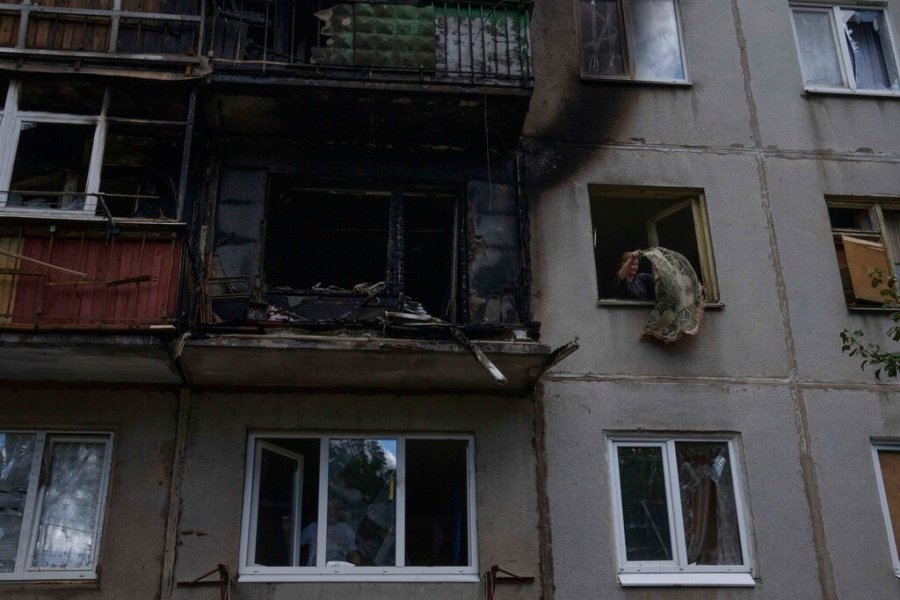BRUSSELS (AP) — The European Union’s head office on Wednesday proposed that member states cut their gas use by 15% over the coming months as the bloc braced for a possible full Russian cutoff of natural gas supplies that could add a big chill to the upcoming winter.
While the initial cuts would be voluntary, the Commission also asked for the power to impose mandatory reductions across the bloc in the event of an EU-wide emergency caused by what Commission President Ursula von der Leyen saw as a deliberate attempt by President Vladimir Putin to weaponize gas exports.
“Russia is blackmailing us. Russia is using energy as a weapon. And therefore, in any event, whether it’s a partial major cutoff of Russian gas or total cutoff of Russian gas, Europe needs to be ready,” von der Leyen said.
EU member states will discuss the measures at an emergency meeting of energy ministers next Tuesday. For them to be approved, national capitals would have to consider yielding some of their powers over energy policy to Brussels.
“We have to be proactive. We have to prepare for a potential full disruption of Russian gas. And this is a likely scenario. That’s what we’ve seen in the past,” von der Leyen said, adding that Kremlin-controlled Gazprom showed scant interest in market forces and instead played a political game to choke off the EU.
Saving 15% on gas use between August and next March will not come all that easy. The European Commission signaled its proposed target would require EU countries as a whole to triple the rationing achieved to date since the Russian invasion of Ukraine started Feb. 24.
“EU-level savings so far have been equal to 5%,” EU Energy Commissioner Kadri Simson said. “This is clearly not enough.”
Wednesday’s proposal comes at a time when a blog post from the International Monetary Fund has warned about the weaknesses of the 27-nation bloc.
“The partial shutoff of gas deliveries is already affecting European growth, and a full shutdown could be substantially more severe,” the IMFBlog warned. It added that gross domestic product in member nations like Hungary, Slovakia and the Czech Republic could shrink by up to 6%.
Italy, a country already facing serious economic problems, “would also face significant impacts.”
EU economic forecasts last week showed Russia’s war in Ukraine is expected to wreak havoc with economic recovery for the foreseeable future, with lower annual growth and record-high inflation. The disruptions in Russian energy trade threaten to trigger a recession in the bloc just as it is recovering from a pandemic-induced slump

Since Russia invaded Ukraine, the EU has approved bans on Russian coal and most oil to take effect later this year, but it did not include natural gas because the 27-nation bloc depends on gas to power factories, generate electricity and heat homes. Now, von der Leyen is convinced Putin will cut off gas anyway to try to wreak economic and political havoc in Europe this winter.
“Putin is trying to push us around this winter and this he will dramatically fail if we stick together,” said von der Leyen.
There are fears that the energy crisis will get worse if Moscow does not restart the key Nord Stream pipeline to Germany after scheduled maintenance ends Thursday. Putin has left everyone second-guessing on Wednesday.
The Russian leader questioned the quality of the repair work done on the Nord Stream 1 turbine. “They say that they will return these machines — one, in any case — but in what capacity they will return, what are the technical parameters after leaving this scheduled repair? Maybe they will take it and turn it off at some point, and Nord Stream 1 will stop,” he said.
The aim of von der Leyen’s plans is to ensure essential industries and services like hospitals can function, while others would have to cut back. That could include lowering heat in public buildings and enticing families to use less energy at home.
EU nations and the Commission have gone on a buying spree to diversify their natural gas sources away from Russia, but they are still expected to fall far short of providing businesses and homes with enough energy in the cold months.
Russia has cut off or reduced gas to a dozen EU countries, and there are fears that the energy crisis will get worse if Moscow does not restart a key pipeline to Germany after scheduled maintenance ends Thursday.
The energy squeeze is also reviving decades-old political challenges for Europe. While the EU has gained centralized authority over monetary, trade, antitrust and farm policies, national capitals have jealously guarded their powers over energy matters.
The European Commission has spent decades chipping away at this bastion of national sovereignty, using previous supply disruptions to secure gradual gains in EU clout. The five-month-old Russian invasion of Ukraine is now the starkest test of whether member countries are willing to cede more of their energy powers.
During the COVID-19 pandemic, member states did join in common action to help develop and buy vaccines in massive quantities in an unprecedented show of common resolve in the health sector.
“We have learned our lesson from the pandemic. We know that in such kind of a crisis, our worst enemy is fragmentation,” said von der Leyen.






